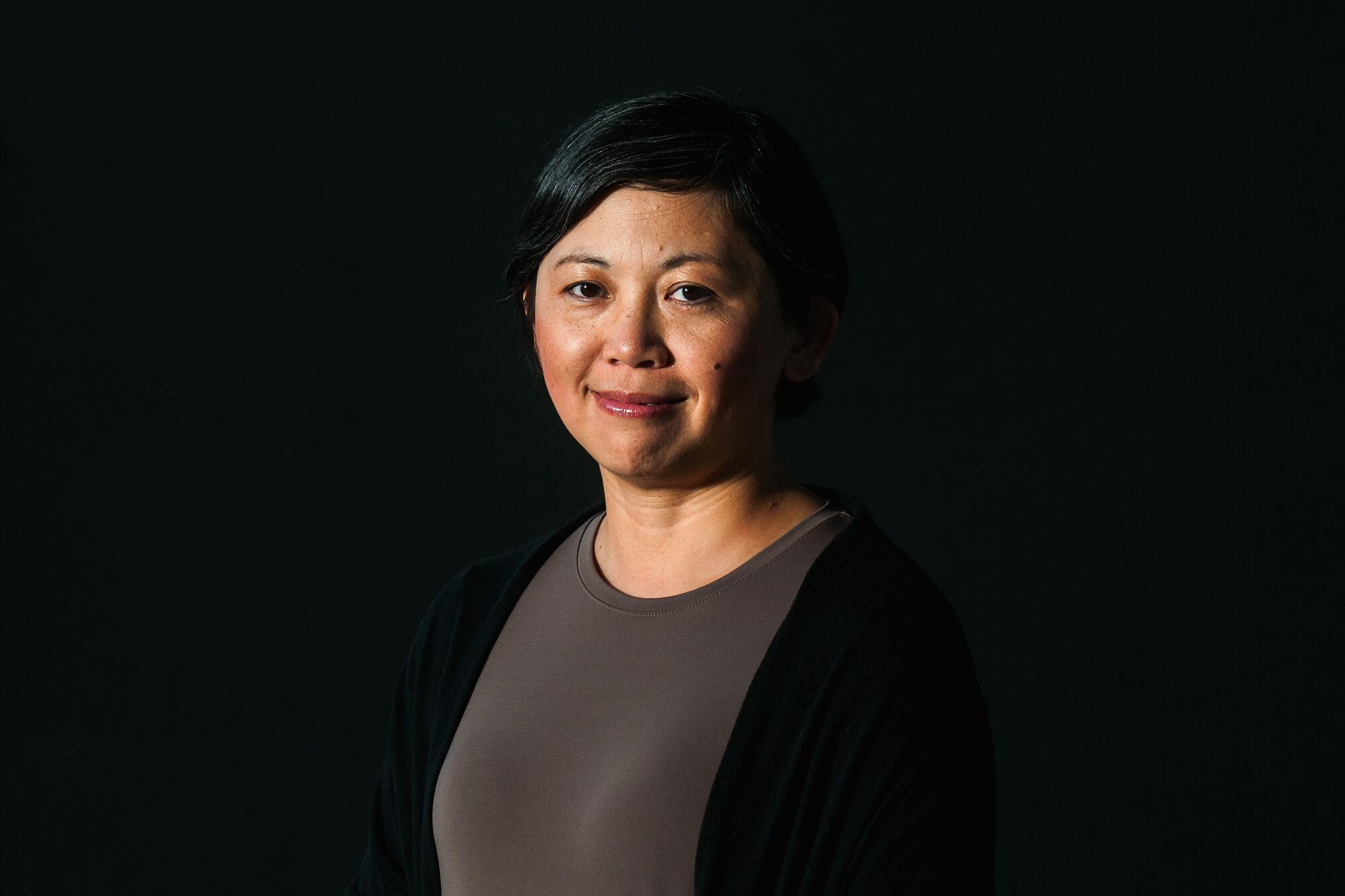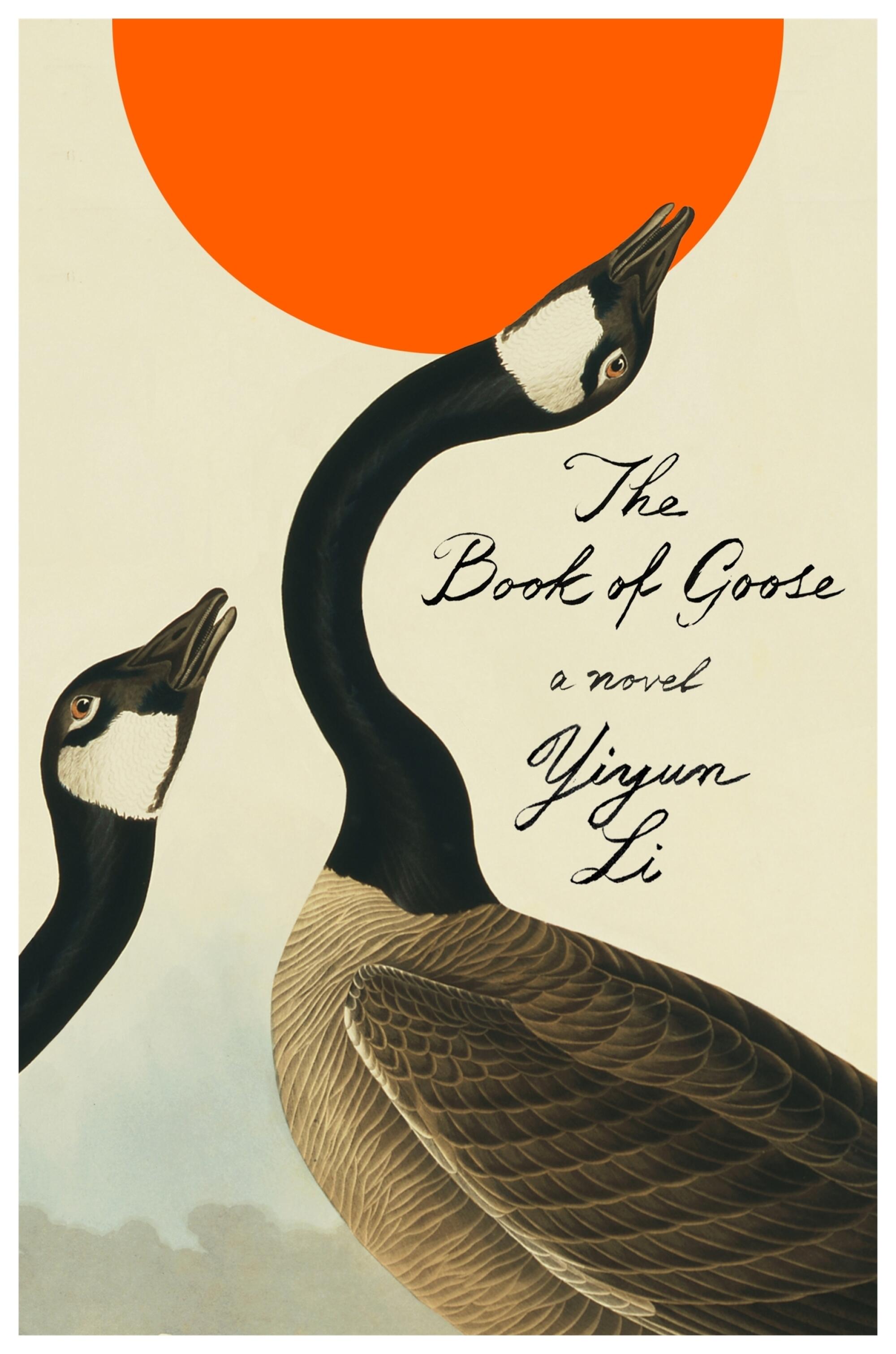
On the Shelf
The Book of Goose
By Yiyun Li
FSG: 368 pages, $28
If you buy books linked on our site, The Times may earn a commission from Bookshop.org, whose fees support independent bookstores.
Yiyun Li laughs a lot. In the hour we spent on Zoom, nearly every time she spoke there was a moment she would stop, look down, then up — and she would laugh. “Am I starting to sound cuckoo?” she said a couple of times (she was not), before laughing again. Talk of Li’s work sometimes lingers on its sadness, a description Li is well aware of: “People find me bleak,” she said, then made a face; both of us laughed.
Three of the friends to whom I recommended Li’s new novel, “The Book of Goose,” paused for a moment and then asked, concernedly, how sad is it? I understood this recurring question; I was also appalled by it. Li’s books render the world so sharply that they might draw blood, but they are also shot through, I think, with an extraordinary hopefulness. If they don’t often end particularly well for the characters, they possess a fullness, a deep love of both language and character that leave me, if not exactly happy, then at least fully sated at the end.
“The Book of Goose,” Li’s fifth novel (there are also two story collections and a memoir), is no exception. It is, however, a departure in many ways: historical, set in rural post-World War II western France, concerned almost wholly with the lives of children. (Our narrator, 28, recounts the years when she was 12 to 14). It’s a story of adolescent female friendship, of larger networks of exploitation and of an artist coming to be.
But the beauty of reading a body of work as extensive and rich as Li’s is that you are able to see how the best novels defy summary. Like all Li’s books, “Goose” does not, as Li describes it, “linger,” because “lingering is for the reader”; it moves unapologetically through time, attuned to the inner workings of its characters while never dwelling on the many violences and losses they experience.
“Goose” started for Li as every story of hers has: with the characters. She talks about them as if they live inside her, as if her process comes down to just listening very carefully: “They came together as a pair for two moments. One was when they were talking to each other and Fabienne said, ‘how do you grow happiness?’ And Agnes said, ‘can you grow happiness?’ And Fabienne said, ‘yes, we’re going to grow potatoes and beets …’ And [then] Agnes has this moment of disappointment and thinks, well, shouldn’t happiness be a little bit more outstanding, more extraordinary than that?”
The novelist has written of her own brushes with suicide and the loss of her son; “Must I Go” stars an indelible narrator fighting the same demons.
Both Fabienne and Agnes have mostly absent parents. They have each other and not much else. Fabienne, at least in the beginning, is in charge. She persuades Agnes to play all sorts of mischievous “games” — and, eventually, to transcribe the violent stories she conjures into a book that is published under Agnes’ name. Briefly, the book makes Agnes famous. The girls drift apart.
The book we’re reading is also written by Agnes, now married and living in America, after Fabienne has died in childbirth at the age of 28. “No, it is not Fabienne’s ghost that has licked the nib of my pen clean,” writes Agnes, “or opened the notebook to this fresh page, but sometimes one person’s death is another person’s parole paper. I may not have gained full freedom, but I am free enough.”

Li tells me the characters came to her together, “yin and yang,” only whole as a dyad. Yet the book opens with Fabienne dying. The reality of this, the clarity with which Li sees and understands both the connectivity of these girls and their inevitable separateness, comes from something else she talked a lot about, which is the way a writer works constantly to take in and reflect the world. Li used the analogy of a mirror we each carry on our shoulder, “but that mirror is not just capturing reality, not just the reflections of reality. We each do something through that mirror that creates a new and separate world, a combination of real and unreal.”
I asked her what she is most interested in capturing in her mirror. “It’s something like a shadow,” she says. “I cannot really see it … something that’s so fleeting, but you know, it’s real. It exists, but only momentarily.” She said her mirror is particularly attentive to “violences both psychological and physical; violences so small that if you are not acute, you won’t feel it.”
This too has the whiff of the mystic about it. (And it was here that Li made a comment about sounding cuckoo.) But it also taps into the precision with which her books ask the reader to attune themselves to her characters’ realities, even if the most we can capture of them is merely a shadow.
Before getting her masters in fine arts at the Iowa Writers’ Workshop, Li came to Iowa City to study immunology. “In science you can never say you know something,” she said. “You just say you know a little bit of something and you can know a little bit more based on that information.” She says, of Agnes, “We cannot get her chemical components, cannot get everything out of her. And yet, she’s there.”
The latest from Ling Ma, Yiyun Li, Russell Banks and Namwali Serpell as well as exciting newcomers round out our critics’ most anticipated fall books.
In 2017, while working on her novel, “Must I Go,” about a woman who has lost her daughter to suicide, Li, lost her own son Vincent, then 16, to suicide. She set aside the novel and, in the months following Vincent’s death, wrote “Where Reasons End,” a novel consisting of conversations between a mother and the ghost of her son. It captures an almost unfathomable shadow. I have read the book twice and can only tell you what it feels like in my body each time I think of it: queasy and astounded, grateful, devastated, startlingly alive and stunned to be.
All of this becomes possible only through Li’s extraordinary attention to the language. She is a famously devoted reader, often dipping into many books at the same time over a period of weeks. She says it feels more respectful to the writer to linger in this way. She does not write every day, but she will never go a day without reading.
In 2020, with Brigid Hughes at A Public Space, Li read Tolstoy’s “War and Peace” with a group of people on Twitter in this same way: 10-15 pages per day over 85 days. This experience became a book, “Tolstoy Together,” which A Public Space published last year. In the introductory letter, Li writes, “I have found that the more uncertain life is, the more solidity and structure Tolstoy’s novels provide. In these times, one does want to read an author who is so deeply moved by the world that he could appear unmoved in his writing.”
Reading this, having spoken to her — having recently felt compelled (before getting this assignment) to reread both “Where Reasons End” and her memoir, “Dear Friend, From My Life I Write to You in Your Life” — it felt like a perfect description of the power of Li’s own work: her attunement to the violences her characters experience, her willingness to bear their pain even as her fiction remains impassive.
Though time has shifted something for Li. In recent years, she has let her fiction seep into her more fully. She remembers a reader asking a few years ago how she knew when she was done with a novel; she said it’s “when the book has wounded me.” In the case of Fabienne and Agnes it was their inevitable coming apart, the requirement that Fabienne die at the outset. “For so long, I let myself think: wouldn’t that be great if they could stay forever and ever together? But that’s a moment in their life. Can you stay in that moment? Can you keep that moment alive? No, nobody can do that.”
Yiyun Li is a literary sensation, but that hasn’t impressed immigration officials, who rejected her request for residency.
Strong is a critic and the author of the forthcoming novel “Flight.”
More to Read
Sign up for our Book Club newsletter
Get the latest news, events and more from the Los Angeles Times Book Club, and help us get L.A. reading and talking.
You may occasionally receive promotional content from the Los Angeles Times.










